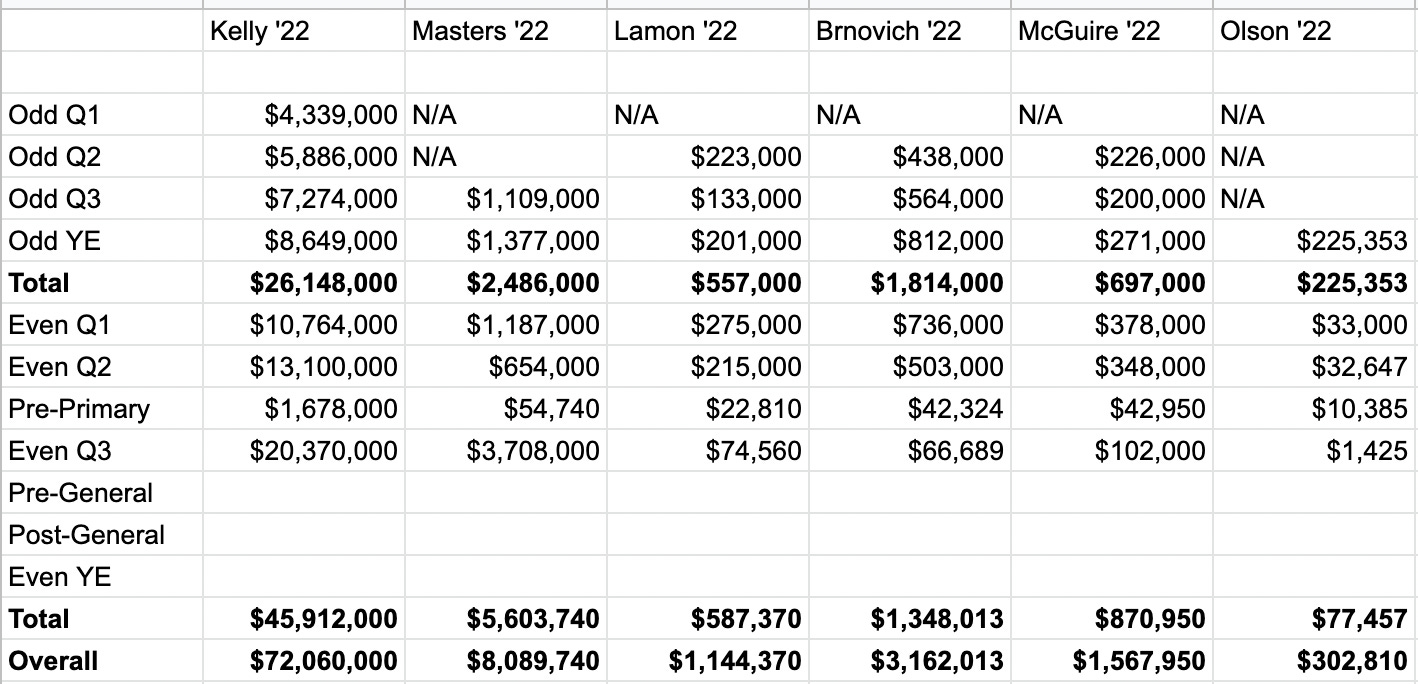Hodge, O'Halleran, Stanton and Engel lead GOP opponents in Q3 fundraising
Dems have the money, but will they have the votes?
Continuing the trend that I’ve written about all week, Democrats in Arizona’s four competitive congressional races are all leading their Republican opponents in fundraising over the past quarter.
Not to mention Mark Kelly who continues to raise more than just about anybody in the country.
The U.S. Senate race, and Kelly’s campaign coffers, has been written about ad nauseam, so I’ll only mention that one in further context compared to the 2018 and 2020 cycles in this handy spreadsheet I’ve been updating for more a year.
This only includes amounts raised, not spending or cash on hand.
This also does not include loans or transfers, only individuals and PAC contributions1

Now for the congressional races.
In CD1, Jevin Hodge, the Democrat, raised $868,000 for Q3 bringing his overall total to $1.9 million. He spent $456,000 for the quarter and $1.05 million overall and is left with $856,000 to spend.
It’s nothing new at this point for incumbent Republican Rep. David Schweikert to trail his opponent in fundraising (Dr. Hiral Tipirneni crushed him throughout the entire 2020 campaign, but he still won by four points in what was considered a potential flippable seat for the Democrats). But trailing in a seat that narrowly voted for Biden and only has an R+3 registration advantage doesn’t spell good things.
Schweikert raised $326,000 for the quarter putting his overall haul at $1.25 million. Schweikert loaned himself $60,000 and overall $260,000 (Hodge has zero loans), spent $316,000 for the past three months and $1.6 million to date and the incumbent only has $245,000 left to spend, but it looks like national Dems aren’t liking their chances despite the numbers.


In Congressional District 2, Republican challenger Eli Crane is raising a lot of money (he’s put in a decent amount in loans), but still fell short of Tom O’Halleran the moderate three-term incumbent.
Crane raised $844,000 putting his total haul at $2.74 million. O’Halleran is at $984,000 for the quarter and $3.7 million overall. Crane didn’t loan himself anything for the quarter but has spent $100,000 to date. No loans for O’Halleran.
The Republican spent $667,000 and $2.46 million overall compared to O’Halleran’s $1.2 million and $2.1 million to date.
On hand, Crane has $565,000 left compared to the incumbent’s $1.8 million.
Congressional District 4 pits two-term incumbent and former Mayor of Phoenix Greg Stanton against his Republican challenger Kelly Cooper.
Cooper’s fundraising cannot compete with Stanton’s prominence. Stanton outraised him by roughly half a million dollars.
Stanton brought in $872,000 for the quarter to Cooper’s $378,000. Their overall totals are $3.9 million and $590,000, respectively. Cooper is also loan-heavy bringing in $135,000 of his overall total from loans (even after paying off $630,000 in loans through the cycle, $600,000 this cycle). He spent $1.15 million for the quarter which is one million less than Stanton’s $2.13 million.
Cooper also has a small war chest of $252,000 remaining compared to Stanton’s nearly $2 million.
Like Hodge in CD1, national Democrats appear ready to give up on Kirsten Engel, the former state lawmaker, in Tucson’s CD6. She’s running against Republican Juan Ciscomani, the former Gov. Doug Ducey advisor, who with help from close political allies got a favorable district drawn for him in this race.

Despite all of that, Engel is still outraising Ciscomani who has Ducey’s fundraising help at his disposal, but it’s close.
Ciscomani raised $642,000 for the quarter and $2.35 million overall. He spent $853,000 between July and September and was left with $353,000 not including the outside spending.
Engel’s totals were $696,000 for Q3 and $1.97 million to date. She spent $834,000 and had $202,000 remaining on hand.
David Mehl, the Republican commissioner on IRC, answered questions over whether he preferred Ciscomani for Congress given their Tucson ties and Mehl’s developing status. He denied that he and his son (who at the time gave Ciscomani’s campaign money) had any “business interests” in the race.
 Mehl, who is from Pima County, has spearheaded the Tucson congressional district splits that will more than likely solidify a Republican is elected to the new #AZ02. Mehl's son, Jonah, contributed the max to Juan Ciscomani, a Republican running in that district.Mehl proposes moving Sahuarita from CD6 to CD7
Mehl, who is from Pima County, has spearheaded the Tucson congressional district splits that will more than likely solidify a Republican is elected to the new #AZ02. Mehl's son, Jonah, contributed the max to Juan Ciscomani, a Republican running in that district.Mehl proposes moving Sahuarita from CD6 to CD7 Jeremy Duda @jeremyduda
Jeremy Duda @jeremydudaMehl contributed $2,900 to Ciscomani’s campaign on July 6. He also gave $2,900 to Crane. On top of that, Mehl –– who again was the de facto leader of the line drawing among the four partisans on IRC –– contributed to the campaigns of: Linda Evans in Tucson’s LD18 House race; Cory McGarr and Rachel Jones in the Republican-leaning Tucson-based LD17 (that he had a hand in drawing with the help of State Sen. Vince Leach; as well as Justine Wadsack who defeated Leach for the Senate race. Mehl also gave money to Leach for the primary.
In total, he contributed $8,600 to candidates whose lines he helped draw during the once-every-ten-years redistricting process.
Democratic commissioner Shereen Lerner was the only other one of the five IRC members to give anybody money this cycle. She spent $400 total on State Rep. Mitzi Epstein, Stacey Travers and Patty Contreras in LD12 (and Paul Weich during the primary), and Lorena Austin in LD9.
The most interesting thing to me isn’t even about the 2022 cycle, but Sinema has raised the least amount two filing periods in a row since her first two quarter reports in 2017 for the 2018 U.S. Senate race she won (the last time she was on the ballot). Before Q2 this year, Sinema was outraising every Republican Senate candidate in Arizona and brought in at least $1 million each time, but her July and October reports fell short. She still outraised Ruben Gallego both times, but the margins are getting slimmer.



